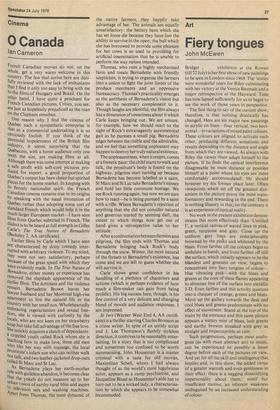Cinema
0 Canada
Ian Cameron
French Canadian movies do not, on the Whole, get a very warm welcome in this country. The few that arrive here are dutifully reviewed with the lack of enthusiasm that I find it only too easy to bring with me to the films of Hungary and Brazil. On the Other hand, I have quite a penchant for French Canadian pictures. Critics, you see, are just as hopelessly prejudiced as the man Oil the Clapham omnibus.
One reason why I find the cinema of Quebec such a sympathetic enterprise is that as a commercial undertaking it is so Obviously foolish. If you think of the perennial hopelessness of the British film Industry, it seems surprising that the Quebecois, with a home audience only one tenth the size, are making films at all. Although there was some attempt at making a safe profit with soft-core pictures produced for export, a good proportion of Quebec's output has been cheap but spirited Pieces for the home market. In keeping with its fiercely nationalist spirit, the French Canadian cinema remains true to its origins by speaking with the nasal intonation of Quebec rather than adopting some sort of standard French which would help it in the much larger European market—I have seen films from Quebec subtitled in French. The dialect is to be heard at full strength in Gilles Carle's The True Nature of Bernadette (Berkeley 2, AA certificate). Earlier films by Carle which I have seen are characterised by dotty comedy interrupted with arbitrary violence. To my mind, they were not very satisfactory, perhaps because of the great speed with which they Were evidently made. In The True Nature of Bernadette, either money or experience has removed the slapdash appearance of the earlier films. The dottiness and the violence remain. Bernadette Brown leaves her lawyer husband and her Montreal high-rise apartment to live the natural life in the country with her small son. Wholeheartedly embracing vegetarianism and sexual freedom, she is viewed with curiosity by the locals, who are not keen on her strawberry souP but take full advantage of the free love. She quickly acquires a clutch of dependants: a crippled youth called Rock whom she is teaching how to make love, three old men Who like her way with massage, the local prostitute's infant son who can neither walk uor talk, and two leather-jacketed drop-outs called St Marc and St Luc.
As Bernadette plays her earth-mother role with guileless abandon, it becomes clear that the yokels do not measure up to her Urban vision of earthy rural bliss and aspire to television sets and washing machines. Apart from Thomas, the most dynamic of the native farmers, they happily take advantage of her. The animals are equally unsatisfactory : the battery hens which she has set loose die because they have lost the ability to survive in the open; the bull which she has borrowed to provide some pleasure for her cows is so used to providing for artificial insemination that he is unable to perform the way nature intended.
Thomas, who runs a highly mechanised farm and treats Bernadette with friendly scepticism, is trying to organise the farmers into a union to fight the joint forces of the produce merchants and an oppressive bureaucracy. Thomas's practicality emerges as the antithesis of Bernadette's vision but also as the necessary complement to it. Though laughs are plentiful, the film always has a dimension of uneasiness about it which Carle keeps bringing out. We are unsure, for example, how we should react to the sight of Rock's extravagantly asymmetrical gait as he pursues a small pig. Bernadette edges between the risible and the admirable, and we feel that something unpleasant may happen to destroy her truly natural existence.
The unpleasantness, when it erupts, comes at a frenetic pace: the child starts to walk and talk, the prostitute's body is found on the highway, pilgrims start turning up because Bernadette has become labelled as a saint, St Marc and St Luc take Bernadette's money and hold her little commune hostage. We see Rock running again, but now we are sure how to react—he is being pursued by a saint with a rifle. Where Bernadette's rejection of anything that she did not consider natural and generous started by seeming daft, the extent to which things now get out of hand gives a retrospective value to her attitude.
After a confrontation between farmers and pilgrims, the film ends with Thomas and Bernadette bringing back Rock's body through the snow. Winter, the most natural of the threats to Bernadette's existence, has come and we are left to guess whether she will survive it.
Carle shows great confidence in his handling of a plethora of characters and actions (which is perhaps evidence of how much a film-maker can gain from being prolific). His big success here, though, is his fine control of a very delicate and changing blend of moods and audience responses. I am impressed.
St Ives (Warner West End 4, AA certificate) is a thriller starring Charles Bronson as a crime writer. In spite of an untidy script and J. Lee Thompson's flashily styleless direction, it contrives to be reasonably entertaining. In a story that is too complicated and sometimes too confused to be worth summarising, John Houseman is a master criminal with a taste for old movies, Maximilian Schell, whom I had always thought of as the world's most lugubrious actor, appears as a camp psychiatrist, and Jacqueline Bisset as Houseman's aide has to turn out to be a wicked lady, a characterisation by which she appears to be somewhat incommoded.


































 Previous page
Previous page